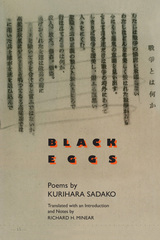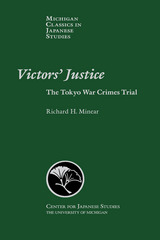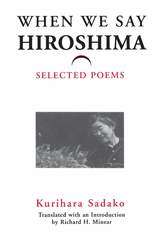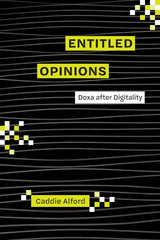3 books about Minear, Richard

Black Eggs
Poems by Kurihara Sadako
Kurihara Sadako; Translated with an Introduction and Notes by Richard H. Minear
University of Michigan Press, 1994
Kurihara Sadako was born in Hiroshima in 1913, and she was there on August 6, 1945. Already a poet before she experienced the atomic bombing of Hiroshima, she used her poetic talents to describe the blast and its aftermath. In 1946, despite the censorship of the American Occupation, she published Kuroi tamago (Black Eggs), poems from before, during, and immediately after the war. This volume includes a translation of Kuroi tamago from the complete edition of 1983.
But August 6, 1945, was not the end point of Kurihara’s journey. In the years after Kuroi tamago she has broadened her focus—to Japan as a victimizer rather than victim, to the threat of nuclear war, to antiwar movements around the world, and to inhumanity in its many guises. She treats events in Japan such as politics in Hiroshima, Tokyo’s long-term complicity in American policies, and the decision in 1992 to send Japanese troops on U.N. peacekeeping operations. But she also deals with the Vietnam War, Three Mile Island, Kwangju, Greenham Common, and Tiananmen Square. This volume includes a large selection of these later poems.
Kurihara sets us all at ground zero, strips us down to our basic humanity, and shows us the world both as it is and as it could be. Her poems are by turns sorrowful and sarcastic, tender and tough. Several of them are famous in Japan today, but even there, few people appreciate the full force and range of her poetry. And few poets in any country—indeed, few artists of any kind—have displayed comparable dedication, consistency, and insight.
[more]

Victors’ Justice
The Tokyo War Crimes Trial
Richard H. Minear
University of Michigan Press, 2001
In the aftermath of the war in the Pacific, the victorious Allies brought to trial Tojo Hideki and twenty-seven other Japanese leaders for “crimes against peace” and “crimes against humanity.” After two and one-half years, the twenty-five surviving defendants were found guilty of most of the charges. Richard Minear’s comprehensive account, the first in English when it appeared in 1971, at the height of the Vietnam War, reviews the background, proceedings, and verdict of the trial from its Charter and simultaneous Nuremberg “precedent” to its later effects. Minear challenges the world view behind the trial; links it to U.S. policy, particularly in Vietnam; and sharpens the argument on Nuremberg and the feasibility of war crimes trials. In the twenty-first century, as the United Nations undertakes war crimes proceedings in the former Yugoslavia, Sierra Leone, Cambodia, and elsewhere, the issues raised here thirty years ago loom larger than ever.
[more]

When We Say “Hiroshima”
Selected Poems
Kurihara Sadako; Translated with an Introduction by Richard H. Minear
University of Michigan Press, 1999
Kurihara Sadako is one of the poetic giants of the nuclear age. Born in Hiroshima in 1913, she was in Hiroshima on August 6, 1945. From then till now she has addressed her poetry primarily to issues of nuclear destruction, nuclear weapons, and nuclear power. Herself a victim of the world’s first nuclear attack, she became the poetic conscience of the Hiroshima that was no more. But Kurihara turned her attention soon to more controversial issues, including Japan’s role as victimizer in World War II. Many of her poems attack the Japanese government and its policies then and now.
When We Say “Hiroshima” contains a selection of the poems Kurihara wrote between 1942 and 1989. They include meditations on death, on survival, on nuclear radiation, on Japanese politics, on American foreign policy, and on women’s issues.
[more]
READERS
Browse our collection.
PUBLISHERS
See BiblioVault's publisher services.
STUDENT SERVICES
Files for college accessibility offices.
UChicago Accessibility Resources
home | accessibility | search | about | contact us
BiblioVault ® 2001 - 2024
The University of Chicago Press









